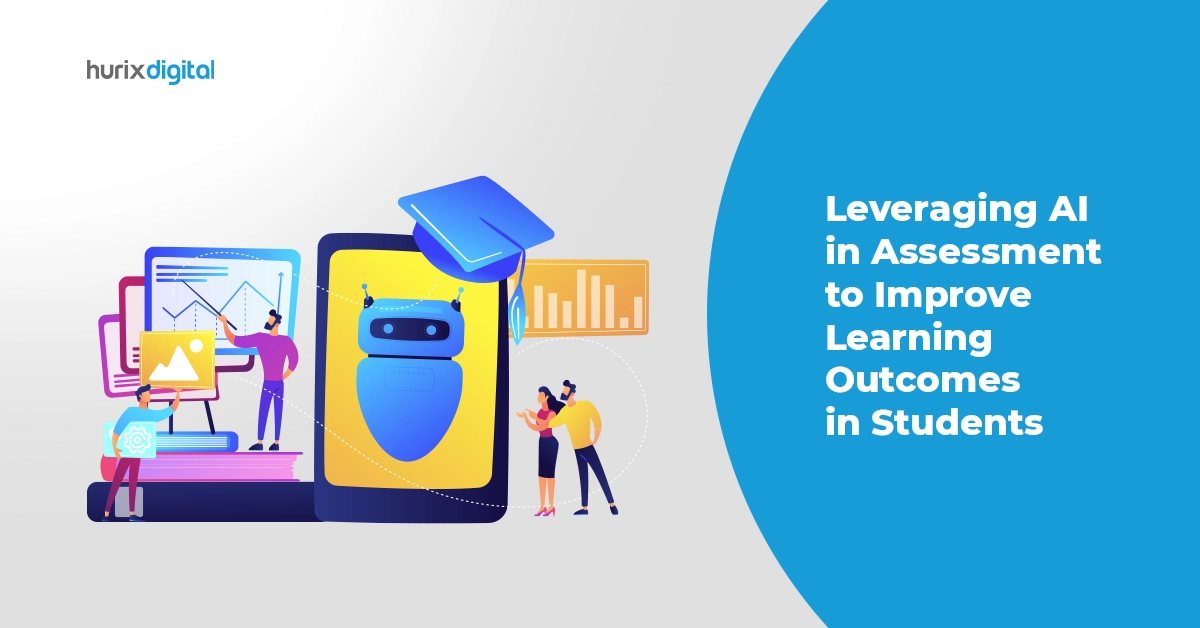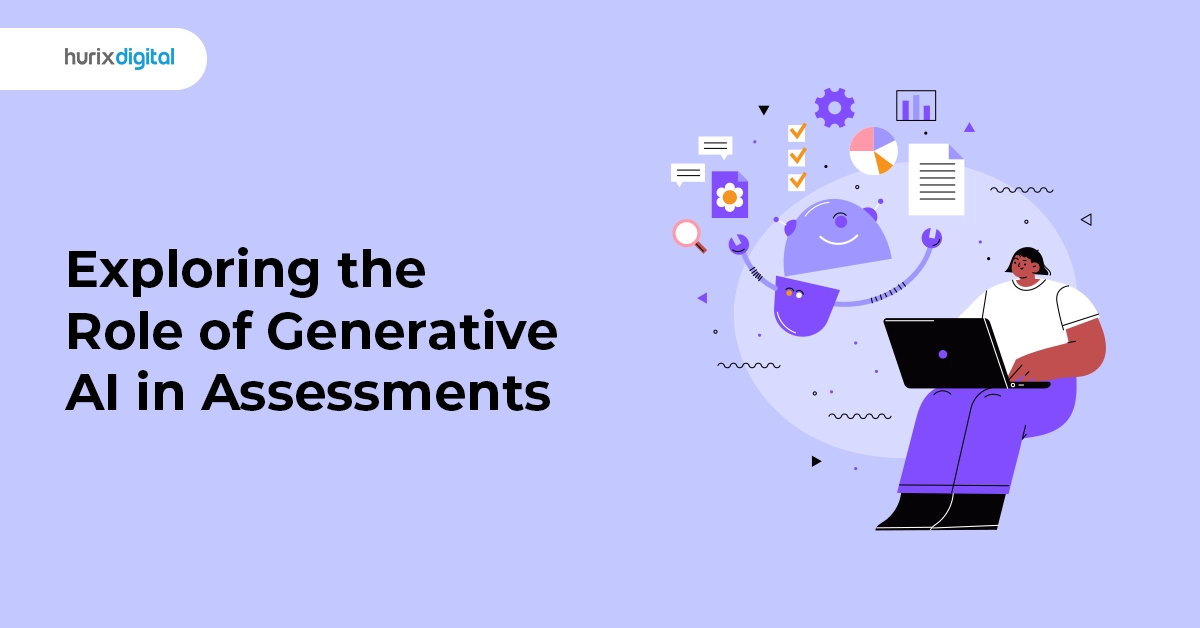Summary
This article has highlighted the various applications of AI in the assessment process. It has also discussed the process of AI in the assessment process, such as the different types of AI, the different types of assessments, and the different types of feedback.
Everyone knows the impact assessments and feedback can have on learners. Assessment plays a vital role in grading students, improving their performance, advancing their knowledge, and motivating them to perform even better.
Artificial intelligence, or AI, is one of the most useful technological tools available that can generate student-centric assessments to enhance their learning outcomes. As per a survey conducted by Forbes in October 2023, more than half of the educators believed that artificial intelligence in learning creates a positive impact on the learning process.
Traditionally, there are various forms of assessment, such as formative assessment, summative assessment, peer assessment, self-assessment, etc. Using AI in the assessment process can bring transformative changes to the education field.
However, the process of AI-driven assessment is markedly different from the process followed during traditional assessment methods. This article explores some of the methods to incorporate AI in assessments that can improve the learning outcomes of students.
Table of Contents:
- Artificial Intelligence in Learning and Evaluation
- AI-Powered Assessments
- Streamline Your Assessment Process
Artificial Intelligence in Learning and Evaluation
AI, or artificial intelligence, means the simulation of human thought processes by a computer system. AI finds application in several fields, such as business, healthcare, engineering, banking, education, and many more.
Artificial intelligence in learning and evaluation is the most recent trend in the education technology domain. While AI can have innumerable applications in education, one major field of AI application is designing and implementing student assessments.
Also Read: AI-Driven Online Tutoring: The Solution for Personalized, Effective, and Scalable Education
AI-Powered Assessments
AI can be used to generate traditional assessment formats such as analogy, multiple-choice questions, etc. Precise grading systems can be implemented for written tasks using AI. Students’ presentations can be evaluated based on diverse benchmarks, including the clarity of the topic, its understanding, and its organization, with the help of AI.
AI even enables us to assess human creativity. Creative work like music, art, and design is judged through advanced algorithms by analyzing the harmony and rhythm in the music, colors, and shapes in the designs.
Recently, electronic assessment platforms have enabled the delivery of assignments that can incorporate multimedia or present questions in a predetermined or random order. Such electronic assessment platforms include timestamps throughout the exam and can help capture misdoings on the examinee’s part.
1. AI-Driven Peer Assessments
Peer assessments are the assessments where the students judge each other’s work and offer feedback on it. However, this type of scrutiny has a few drawbacks, which AI can overcome.
For example, as the peers themselves are on the same learning path as the assessee, the feedback from them may sometimes be unreliable. Using AI-driven assessment tools, it becomes convenient to ensure the reliability of this type of assessment.
AI algorithms streamline the process and help perceive the feedback provided by the most reliable peer. It also conducts quality checks for the feedback provided, ensuring that the feedback provided is relevant.
AI also helps match students for peer review based on complementary strengths, weaknesses, and interests.
2. Authenticity and Quality checks using AI
Some AI tools help detect plagiarism in written assignments by reporting if a major chunk of an assignment matches some other source.
Hence, educators can use AI to scrutinize the authenticity of written assignments and judge their quality. They can impress upon the learners to write original assignments which improves their skills.
3. Assessing the Application of Knowledge Using AI to Improve Teaching and Instruction Deficits
The primary end-point of AI in assessments is to understand how the learners grasp the topic and measure their performance. For this, it assesses how the students apply their knowledge in different situations and whether the application is appropriate or not.
Using AI algorithms, these parameters are then analyzed to understand if the learner has comprehended the task correctly. This helps educators identify and rectify any teaching deficits.
AI can analyze the performance of the student to predict which teaching techniques would be most effective for knowledge retention for that specific pupil. Instructors may then alter the instructional strategies, which enable students to understand the concept better, improving their learning outcomes.
4. Simulations for Assessing Skills
AI-generated simulations can enhance different sectors of education, including medical education, flight training, virtual internships, etc. AI has made acquiring technical or non-technical skills in these fields very easy and has contributed a lot to patients’ and travelers’ safety.
Simulation-based assessments are increasingly used as an assessment tool in healthcare and aviation training. It helps trainees to strengthen their skills, instill better decision-making skills, and improve their performance.
In virtual internships, the learners can get an acute experience of reality by performing actions and tasks that professionals are required to do every day by interning at a fictional company. AI helps them undergo real-time situations and apply their knowledge, preparing them to overcome difficult situations and challenges when they eventually start applying these skills in real life.
5. Feedback as a Tool to Improve Skills
AI offers scores for essays, and some systems even provide a platform for students to practice and improve their writing skills. AI-driven assessment systems provide accurate and personalized feedback for learners’ written assignments.
AI, with its natural language processing models, enables easy analysis of structure, language, and the quality of the assignment. The learners can improve their writing quality and structure using personalized feedback provided by AI, thereby increasing their learning outcomes.
Also Read: Top 10 AI Trends Reshaping the World of Education in 2024
Streamline Your Assessment Process
Along with providing new learning opportunities, AI-enhanced learning brings significant benefits to students and teachers. By using AI in assessment, we can automate the grading process, which will save time for both learners and teachers.
AI can also identify individual strengths and weaknesses and tailor constructive feedback to address specific areas for improvement, leading to more effective learning, better motivation, and a growth mindset among students. In short, AI-powered education is a game-changer. And AI in assessment, undoubtedly, has a bright future.
Hurix Digital’s AI-driven assessment tools allow instructors to streamline the assessment process for various types of assignments and help them provide feedback more efficiently. This leads to an unbiased assessment process, creating a conducive environment for effective learning.
To embrace these innovations and transform your assessment landscape using AI, get in touch with our experts today!







